| Srl | Item |
| 1 |
ID:
125982
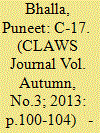

|
|
|
| 2 |
ID:
106565
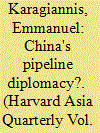

|
|
|
| 3 |
ID:
185303
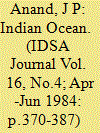

|
|
|
| 4 |
ID:
141622
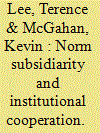

|
|
|
|
|
| Summary/Abstract |
Given competing interests among the three littoral states of Malaysia, Singapore and Indonesia, what explains the nature and timing of their cooperative arrangement in combating maritime piracy in the Straits of Malacca in the post-2004 period? This observation is especially puzzling because the material and strategic interests of these actors generally did not change during the time period that witnessed increased cooperation. We argue that key developments of the anti-piracy regime in the Straits of Malacca cannot be fully explained by rationalist approaches, which traditionally stresses material and national interests of states. By critically engaging constructivist approaches, this paper posits that Malaysia, Singapore and Indonesia engaged in a process of norm subsidiarity. Through norm subsidiarity, relatively weak states get together to develop their own rules to prevent their exclusion or marginalization from institutions of global governance by more powerful actors. The littoral states engaged norm subsidiarity to resist extra-regional attempts to manage piracy in the Straits of Malacca. These extra-regional security proposals triggered a powerful regional cognitive prior, providing the impetus for an indigenous response, leading consequently to a collective cooperative effort to deal with the threat of piracy.
|
|
|
|
|
|
|
|
|
|
|
|
|
|
|
|
| 5 |
ID:
158946
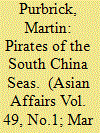

|
|
|
|
|
| Summary/Abstract |
Piracy has been endemic in the South China and surrounding seas for centuries. There is a long history of piracy waxing and waning depending on the political and economic situation in the region. There have been differing levels of piracy on the South China Coast and the seas around the Philippines, Malaysia, and Indonesia. In the Sulu and Celebes Seas as well as off the coast of Aceh, there are examples of piracy used as a tactic by groups also engaged in terrorism. Piracy has periodically been suppressed by a strong naval power in the region. The growth and projection of Chinese naval power to control the South China Sea to the extent of the ‘nine dash line’ has suppressed piracy on the China Coast and in the South China Sea, but had limited impact on the Straits of Malacca and the seas around Borneo and Mindanao.
|
|
|
|
|
|
|
|
|
|
|
|
|
|
|
|
| 6 |
ID:
185309
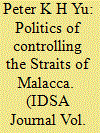

|
|
|
| 7 |
ID:
110525
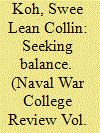

|
|
|